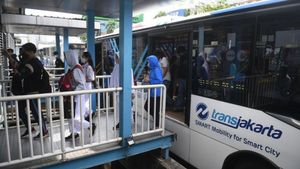JAKARTA - Sun Life Asia's latest study, Retirement in Today's Perspective: Preparing for a Peaceful and Prosperous Old Age, reveals the challenges and opportunities in retirement planning in Asia. The study was conducted amid significant demographic changes in Asia Pacific, where it is estimated that one in four people will be over 60 by 2050.
The survey involved 509 respondents in Indonesia and more than 3,500 respondents across Asia, including China, Hong Kong, Malaysia, the Philippines, Singapore, and Vietnam. The aim of the survey was to understand the aspirations and practices of retirement planning among people in Asia.
Most Respondents Do Not Have a Mature Retirement Plan
The study revealed that the majority of respondents are not financially prepared for retirement. Despite the increasing desire to achieve financial stability in old age, many individuals postpone retirement planning until closer to retirement itself. Survey data shows that 67 percent of respondents will only start planning for retirement funds five years or less before retirement, while 19 percent have no retirement plan at all.
Kah Jing Lee as Chief Client Officer of Sun Life Indonesia stated that social changes and increasing life expectancy have influenced the retirement planning process in Asia.
"Our survey shows that although awareness of the importance of financial stability in retirement is increasing, there is still a gap between awareness and real action by the community. In fact, retirement planning that is prepared as early as possible is the key to achieving a prosperous old age," he said in a written statement, Tuesday, October 8.
Although the majority of respondents allocate at least 10 percent of their income for retirement, unfortunately 27 percent of respondents do not allocate special funds for retirement, and on average respondents only rely on conventional savings of 23 percent to meet financial needs in old age. This indicates the need to increase financial literacy in the community regarding the importance of comprehensive retirement planning, including asset diversification into more productive investment instruments.
Many Retirees Didn't Expect Post-Retirement Living Costs to be Higher and Regret Not Preparing for Them Early
This is an important note for the next generation, where 25 percent of retirees admitted that they did not prepare a budget for their retirement expenses, and 11 percent did not expect that living costs would be much higher than expected. This figure is predicted to continue to increase as inflation continues to suppress.
For those who did not expect and have not prepared themselves, the main factors are daily living costs (80 percent) and health costs (53 percent). As a result, many of them have to reduce spending (67 percent) and reduce assets prepared for inheritance (47 percent).
Around 13 percent of retirees expressed regret over financial decisions they made in their youth, with the main reasons being not investing wisely (72 percent), followed by lack of savings (39 percent) and not consulting a financial planner (39 percent).
The Younger Generation Begins to Adjust Expectations by Delaying Retirement and Saving More
Interestingly, the younger generation is increasingly aware of the financial challenges in the future and is starting to adjust their expectations. Workers today expect to retire at an average age of 65, five years later than the average age of retirees today, who stop working at 60.
In addition, 21 percent of those who have not retired are actively delaying their retirement plans, compared with only 13 percent of retirees currently doing so, indicating a shift in economic conditions in Asia.
The main reasons for delaying retirement also varied, including enjoying work (64 percent), a desire to remain physically and mentally active in old age (63 percent), and the need to save more for retirement (63 percent).
Thirty-seven percent of those planning to retire later also cited rising living costs as their main reason, compared with 28 percent of current retirees who delayed retirement for the same reason.
Retirees Who Prepare for Retirement Are Optimistic About Facing a Prosperous Retirement, While Those Who Don’t Are More Likely to Experience Difficulties
The survey revealed a stark difference between two groups: those who plan for retirement as early as possible, known as Gold Star Planners, and those who have no retirement plan at all, known as Retirement Rebels. The first group planned their retirement more than five years before retirement, saved more than 10 percent of their income for retirement, and supplemented their protection with retirement insurance products.
When compared to those who had no retirement plan at all, significant differences were seen. In Asia, those who planned for retirement were more likely to stay within their expected spending limits (73 percent vs. 31 percent) and were less likely to regret financial decisions after retirement (14 percent vs. 40 percent).
The group who prepared for retirement were also more likely to consult with retirement planning consultants, including financial institutions and independent financial planners, and were more confident about their financial health and well-being in old age.
For all respondents, the top retirement aspirations are to spend quality time with family and friends (49 percent), followed by a desire to unwind and relax (16 percent), and to give back to society (15 percent). The biggest concerns about old age are health issues and physical decline (60 percent), factors that can jeopardize the achievement of these dreams.
"Ensuring the well-being of a growing elderly population is a challenge for us. While health is the most important pillar, it is also closely related to financial stability, productive work, and harmonious family and social relationships. Right now, we still have the opportunity to redefine what a peaceful and prosperous retirement looks like. In other words, proactive education is needed so that today's younger generation is ready to face retirement with confidence through mature financial planning," concluded Kah Jing.
The English, Chinese, Japanese, Arabic, and French versions are automatically generated by the AI. So there may still be inaccuracies in translating, please always see Indonesian as our main language. (system supported by DigitalSiber.id)













